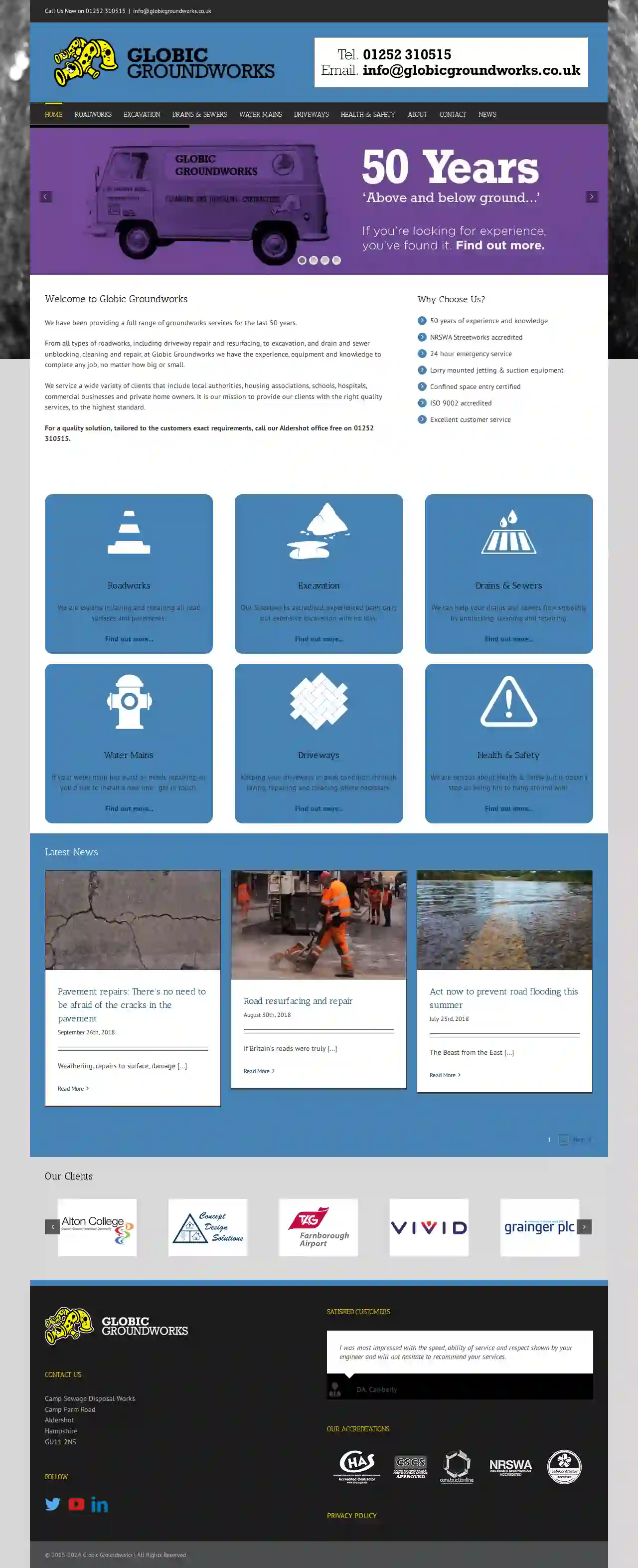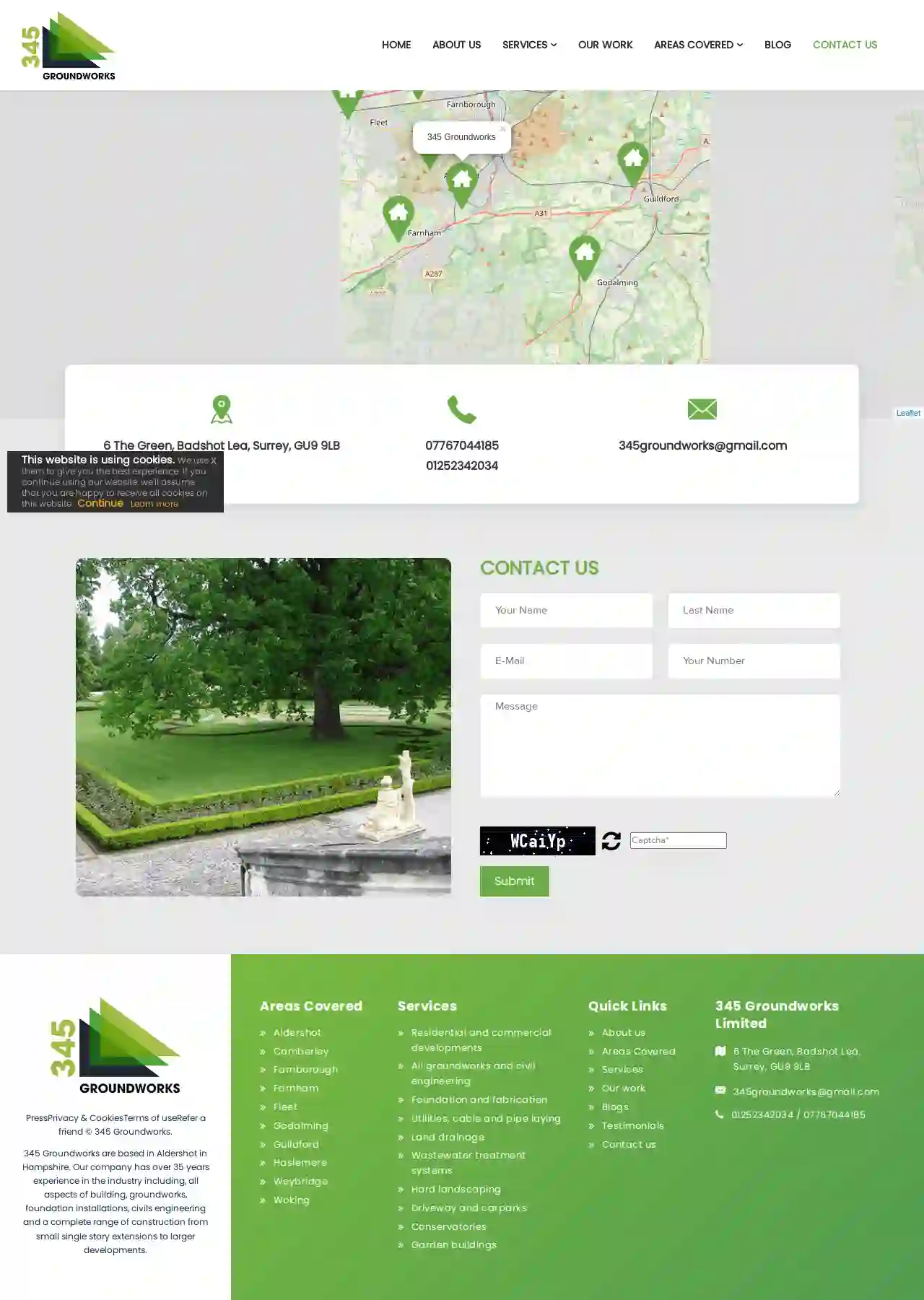Demolition Contractors Aldershot
Top 10 Demolition Company Near Me in Aldershot
Receive up to 3 Demolition Experts quotes for your project today! Compare profiles, reviews, accreditations, portfolio, etc... and choose the best service.

Globic Groundworks
1Camp Sewage Disposal Works, Camp Farm Road, Aldershot, GU11 2NS, GBWelcome to Globic Groundworks Globic Groundworks has been providing a comprehensive range of groundworks services for the past 50 years. From all types of roadworks, including driveway repair and resurfacing, to excavation, and drain and sewer unblocking, cleaning and repair, Globic Groundworks possesses the experience, equipment, and expertise to tackle any project, regardless of size. We cater to a diverse clientele, including local authorities, housing associations, schools, hospitals, commercial businesses, and private homeowners. Our unwavering commitment is to deliver high-quality services that meet the highest standards, exceeding our clients' expectations. For a tailored solution that precisely aligns with your specific requirements, contact our Aldershot office toll-free at 01252 310515.
- Services
- Why Us?
- Accreditations
- Testimonials
- Gallery
Get Quote
345 Groundworks
51 reviews6 The Green, Badshot Lea, Surrey, GU9 9LB, GB345 Groundworks: Your Trusted Partner for Groundworks and Construction 345 Groundworks is a family-run company with over 35 years of experience in the construction industry. We specialize in providing high-quality groundworks and construction services for both commercial and residential clients in the South East of England. We are committed to delivering exceptional results, exceeding expectations, and building lasting relationships with our clients. Our team of skilled professionals is dedicated to providing a comprehensive range of services, including: Ground Investigations and Groundworks Foundation Installations Civil Engineering Construction Landscaping We understand that every project is unique, and we take a personalized approach to ensure that your needs are met. We are committed to clear communication, keeping you informed every step of the way. We are proud of our reputation for reliability, adaptability, and problem-solving skills, all while maintaining a strong commitment to environmental responsibility. Whether you're planning a small-scale project like a driveway or a large-scale development, we have the expertise and resources to deliver exceptional results. Contact us today to discuss your project and learn how we can help you achieve your goals.
- Services
- Why Us?
- Gallery
Get Quote
Over 3,630+ Excavation Companies on our directory
Our excavation contractors operate in Aldershot and surrounding areas!
ExcavationHQ has curated and vetted Top Excavation Contractors in and around Aldershot. Find a reliable business today.
Frequently Asked Questions About Demolition Contractors
- Size and Type of Structure: The method should be suitable for the structure's size, height, and construction materials.
- Site Location and Accessibility: The method should be feasible given the site's location, surrounding buildings, and access constraints.
- Environmental Considerations: Prioritize methods that minimize environmental impact, such as deconstruction or selective demolition if feasible.
- Budget: Different demolition methods have varying costs, so choose one that fits your budget.
- Safety: Prioritize methods that ensure worker safety and minimize risks to surrounding areas.
- Permits and Regulations: Obtain all necessary demolition permits and comply with local building codes and environmental regulations.
- Contracts: Have a clear and comprehensive contract with the demolition contractor outlining the scope of work, payment terms, and liabilities.
- Environmental Laws: Comply with environmental laws regarding hazardous material removal, waste disposal, and pollution control.
- Neighboring Property Rights: Respect neighboring property rights and take measures to prevent damage or disruption to adjacent properties.
- Worker Safety: Adhere to worker safety regulations and provide a safe working environment for demolition crews.
- Size and Complexity of the Structure: Larger and more complex structures, such as multi-story buildings, require more time, labor, and specialized equipment, increasing costs.
- Type of Demolition: Different demolition methods, such as implosion, wrecking ball, or high-reach demolition, have varying costs.
- Material Disposal: Disposal fees for demolition debris can contribute significantly to the overall cost, depending on the type and quantity of materials.
- Location and Accessibility: Demolition in densely populated areas or with limited access may require more planning and specialized equipment, affecting costs.
- Hazardous Materials: The presence of asbestos, lead paint, or other hazardous materials requires specialized removal and disposal procedures, adding to the expenses.
How do I choose the right demolition method for my project?
What are the legal considerations for demolition projects?
Do I need a permit for demolition?
How much does demolition cost in the UK?
How do I choose the right demolition method for my project?
- Size and Type of Structure: The method should be suitable for the structure's size, height, and construction materials.
- Site Location and Accessibility: The method should be feasible given the site's location, surrounding buildings, and access constraints.
- Environmental Considerations: Prioritize methods that minimize environmental impact, such as deconstruction or selective demolition if feasible.
- Budget: Different demolition methods have varying costs, so choose one that fits your budget.
- Safety: Prioritize methods that ensure worker safety and minimize risks to surrounding areas.
What are the legal considerations for demolition projects?
- Permits and Regulations: Obtain all necessary demolition permits and comply with local building codes and environmental regulations.
- Contracts: Have a clear and comprehensive contract with the demolition contractor outlining the scope of work, payment terms, and liabilities.
- Environmental Laws: Comply with environmental laws regarding hazardous material removal, waste disposal, and pollution control.
- Neighboring Property Rights: Respect neighboring property rights and take measures to prevent damage or disruption to adjacent properties.
- Worker Safety: Adhere to worker safety regulations and provide a safe working environment for demolition crews.
Do I need a permit for demolition?
How much does demolition cost in the UK?
- Size and Complexity of the Structure: Larger and more complex structures, such as multi-story buildings, require more time, labor, and specialized equipment, increasing costs.
- Type of Demolition: Different demolition methods, such as implosion, wrecking ball, or high-reach demolition, have varying costs.
- Material Disposal: Disposal fees for demolition debris can contribute significantly to the overall cost, depending on the type and quantity of materials.
- Location and Accessibility: Demolition in densely populated areas or with limited access may require more planning and specialized equipment, affecting costs.
- Hazardous Materials: The presence of asbestos, lead paint, or other hazardous materials requires specialized removal and disposal procedures, adding to the expenses.